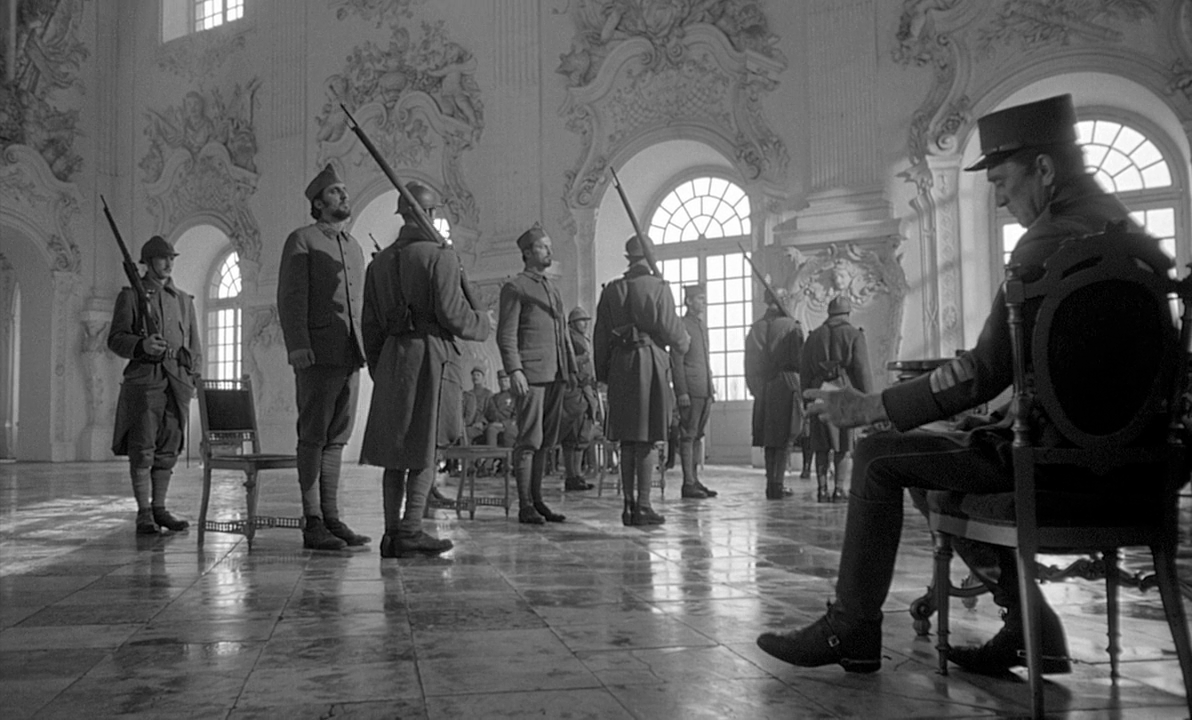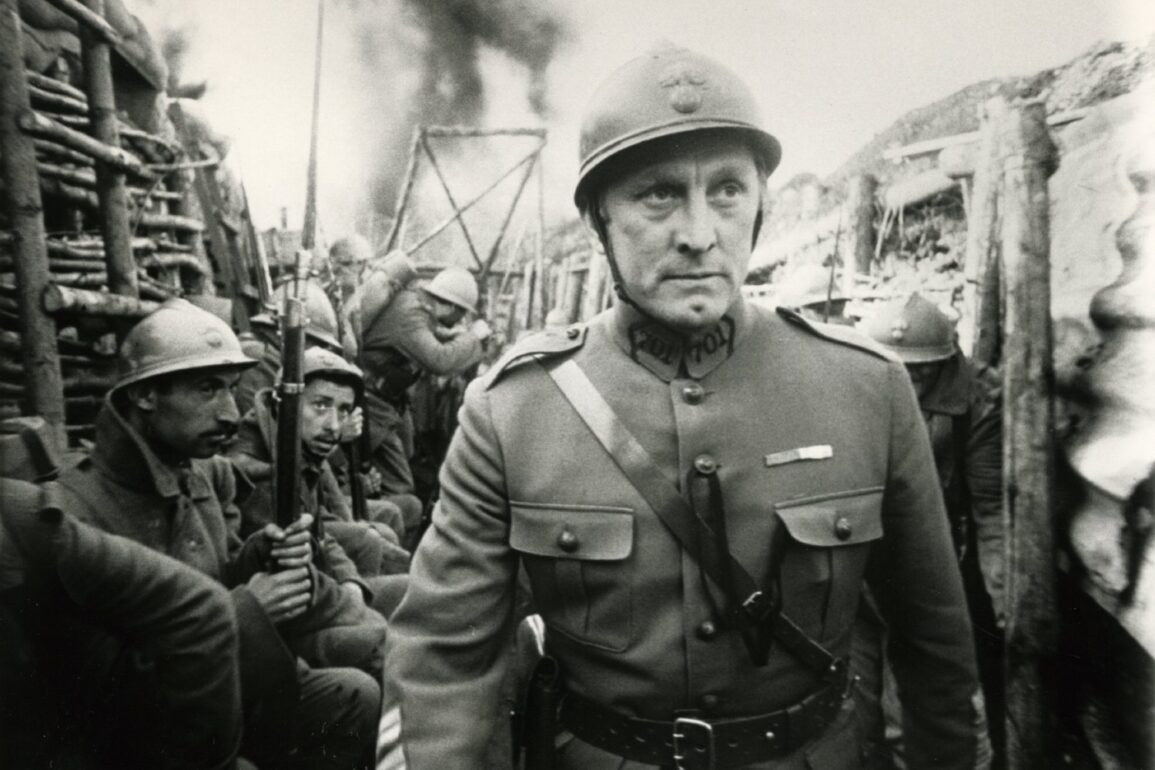“There’s no such thing as an anti-war movie,” stated highly acclaimed French filmmaker Francois Truffaut. While a section of the critics dismissed his claim as snobbery of European artistic brand of filmmaking, there has been considerable debate regarding the true nature of the statement. Probably, Truffaut tried to imply that showing combat on-screen unwittingly glorifies war and its associated features like comradeship among soldiers, inhuman courage, loyalty and patriotism. The horrifying nature of violence ultimately gets toned-down.
Stanley Kubrick’s 1957 movie Paths of Glory based on Humphrey Cobb’s novel was perhaps the most fitting reply to Truffaut. Unlike Kubrick’s later film Dr. Strangelove or Charlie Chaplin’s The Great Dictator which indirectly conveyed the anti-war message, Paths of Glory dedicates a major part of its 88 minutes running time to show how actual battles were fought during World War I. Kubrick brilliantly exposed how foot-soldiers of the military are always exploited as political tools by the higher authorities. The corrupt hierarchical organizational structure and the hypocrisy and bigotry of people bestowed with power are enough to turn someone into a cynic.
In the film, French General Broulard (Adolphe Menjou) orders his subordinate General Mireau (George Macready) to carry out a suicide mission against Germany by luring him with a promotion opportunity. Mireau passes on the responsibility to Colonel Dax (Kirk Douglas) who initially protests but later succumbs to the order of his superior officer. What follows is a tale that will make anyone shudder with indignation. Corruption, manipulations, abuse of power and all sorts of injustice possible in the armed forces come to light. After the attack fails, Mireau chooses to court-martial three of his soldiers, chosen arbitrarily, to set an example. Dax, who used to be a criminal lawyer prior to joining the military, tries his best to defend the three innocent men.

Throughout the trial, we witness travesty of justice, violation of civil rights and how military courts are farce. No one pays heed to evidences; everything is a big setup to satisfy the arrogance of the powerful. Despite a whole-hearted effort from Dax, both on humanitarian and legal grounds, to earn clemency for the condemned three, they are ultimately shot dead by a firing squad. In the meantime, it is revealed that Mireau once ordered firing on his own troops during the battle.

In Paths of Glory, Kubrick is at his cinematic best. The stunning visuals coupled with a brilliant background score capture the tension as well as the irony throughout the movie. The intense scene of Colonel Dax walking through the deadly trenches captured by a wide-angle tracking shot was revolutionary in terms of technique and has been revisited by many filmmakers since then. The movie is perfectly paced with a series of powerful scenes weaving a gut-wrenching story. Such remarkable is Kubrick’s narrative that the viewer’s state of mind continuously switches between moral outrage and emotional devastation. An important facet is that throughout the film, no German soldiers are shown. The French appears tangled in their own mess, unable to resolve the indecisiveness, fighting the demon within themselves. For the three court-martialed men, their own officers turn out to be the nemesis and not the ‘enemy’ Germans. Even the name of the film represents irony, as the paths of glory led to nothing but self-destruction.

In another moving scene, one of the condemned men gazes at a cockroach in his prison cell expressing that it will be alive the following day, but not he. His comrade kills the cockroach and exclaims that he now has the edge. Colonel Dax is presented as a righteous man possessing the courage to rise above petty nationalism and vested political interests to stand in favour of justice and humanitarianism — a modern-day superhero.
The final scene of the movie is perhaps the best of the lot. A group of taunting and jeering French soldiers sitting at an inn are suddenly mesmerized when a young German hostage girl starts singing a poignant folk song. The world comes to a standstill, relishing a moment when art transcends all boundaries. Dax, supposed to convey the order to return to the battlefield, looks at his men from outside the inn and decides to allow them to live the moment. Kubrick ends the film there, leaving the audience with a heavy heart.
 Few films, across genres, have been as beautiful, effective and technically brilliant as Paths of Glory. All Quiet on the Western Front (1930) is perhaps the only other movie that truly conveys its anti-war theme. Platoon (1986) too deserves a mention, as does Apocalypse Now (1979). Throughout the years, cinema as a medium has made its best efforts to make us realize the dreadfulness of war and violence. When will we ever learn?
Few films, across genres, have been as beautiful, effective and technically brilliant as Paths of Glory. All Quiet on the Western Front (1930) is perhaps the only other movie that truly conveys its anti-war theme. Platoon (1986) too deserves a mention, as does Apocalypse Now (1979). Throughout the years, cinema as a medium has made its best efforts to make us realize the dreadfulness of war and violence. When will we ever learn?
Also Read – The Definitive Art and Style of Stanley Kubrick

